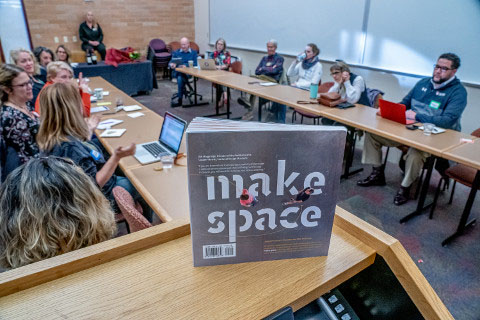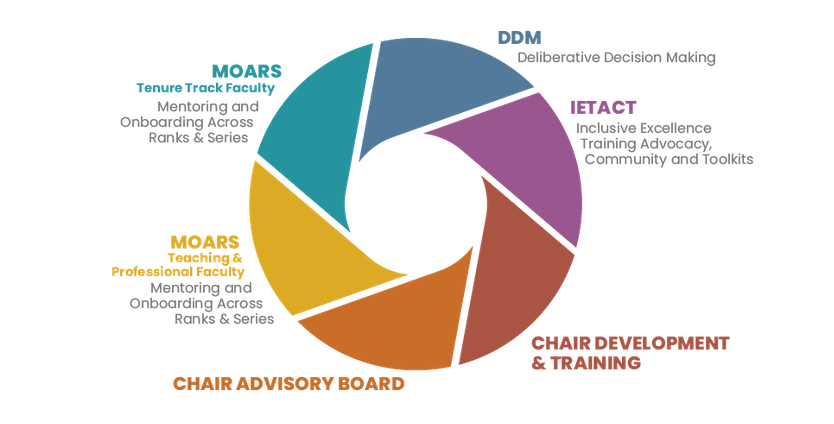DU Symposium 2019
In the summer of 2019, the Vice Provost of Faculty Affairs and the Faculty Senate hosted a summer symposium. For the DU 2019 summer symposium, thirty-four faculty from across campus came together for two days to engage in collective problem-solving around an issue of shared concern: Creating collaborative department cultures and chairs. This was a new kind of opportunity for faculty, one that brought together colleagues from across disciplines and ranks to discuss big ideas, possibilities, and opportunities. We gathered together with a shared purpose: Improving the lives of faculty members in their department. We know that being within a truly fair and fundamentally just collaborative department culture and climate is among most important interventions for the quality of faculty life. That quality of life is what predicts affective commitment to institutional goals and challenges that require innovations across boundaries and disciplines. The presence of open, fair, and transparent departmental deliberation and decision processes and a departmental leader who sees it as their primary responsibility to safeguard the integrity of the process is a necessary condition of a collaborative climate. Such a climate both requires and generates faculty commitment, belonging, and results in greater professional success and satisfaction.

Faculty Participants
Initiatives
Days
Committees
The Symposium Implementation Initiatives are six inter-woven initiatives to improve department culture and climate on the DU campus. These are significant initiatives that will serve the institution, units, and faculty for years to come. These initiatives will train and support chairs and departments and make meaningful changes for all faculty.

Committee members were selected based on the following criteria:
- Representation across units
- Representation of different faculty ranks and series
- Diversity
- Expertise
- Expressed Interest in Serving
Chair Advisory Board (CAB)
The Chair Advisory Board (CAB) is responsible for setting the agenda and coordinating quarterly meetings for better communication with the Provost and all chairs, directors, and people in similar roles. CAB facilitates peer-learning opportunities for Chairs & Directors through Huddles, Peer-to-Peer Solution Seeking Clinics, and individual consultation. CAB’s works supports the entire “life-cycle” of the chair through onboarding, professional development, off-boarding, and chair transition.
Benefits: Decrease stress and fatigue by equipping Chairs with the tools needed to more effectively balance their workload expectations with their own scholarly goals; to create a network where chairs can share insights with one another and more effectively communicate needs to their Deans and the Provost; establish a feedback loop between departments and the Provost.
GOALS
Support chairs through entire “life-cycle” by providing onboarding, professional development, off-boarding, and transition; as well as networking clinics. Create a feedback loop between Chairs & Directors (and people in similar roles) and the Provost’s Office.
SCOPE OF WORK
- Create a clinic for collective problem solving for chair like roles
- Create a Chair Advisory Committee
- Work on quantifying the work of the Chair to inform a lifecycle approach to chair development
INAUGURAL COMMITTEE MEMBERS
Cindy Cragg
Communication Management, University College
David Corsun
Director & Associate Professor, Fritz Knoebel School of Hospitality Management
Hava Gordon
Sociology and Criminology, College of Arts, Humanities, and Social Sciences
Michael Keables
Geography, College of Natural Sciences and Mathematics
Chair Development & Training
Often the scope, role, and responsibilities of the chair, and what is or should be legitimately outside of the purview of the chair, are not entirely clear. Some see the chair as a manager, as the first line of administrative leadership, and/or as a collaborative leader. Even within the same department, faculty may have different ideas of what power a chair can and should assume.
There are three general principles of effective leadership:
- Transparency: Making all kinds of information available and easy to find;
- Uniformity: Leveling the field and dealing equitably with all faculty;
- Assistance: Attending to the needs of faculty by offering mentoring and other types of help.
The presence of an open, transparent, and credible process and a chair who sees it as their primary responsibility to safeguard the integrity of the process is a necessary condition of a collaborative departmental climate—one which both requires and generates faculty commitment and belonging. Given their vital role, chair training is essential.
GOAL
To better equip incoming chairs and like roles with a range of topics including deliberative decision-making and workplace conflict.
SCOPE OF WORK
- Develop and implement a university-wide orientation for new chairs
- Create a university-level handbook
COMMITTEE MEMBERS
Andrea Stanton
Religious Studies, College of Arts, Humanities & Social Sciences
Erin Willer
Communication Studies, College of Arts, Humanities & Social Sciences
Hava Gordon
Sociology & Criminology, College of Arts, Humanities & Social Sciences
Keith Ward
Lamont School of Music, College of Arts, Humanities & Social Sciences
Lorenzo Patelli
Institute for Enterprise Ethics, Daniels College of Business
Michelle Knowles
Chemistry & Biochemistry, College of Natural Sciences and Mathematics
Rashida Banerjee
Teaching & Learning Sciences, Morgridge College of Education
Sandra Eaton
Chemistry & Biochemistry, College of Natural Sciences and Mathematics
Deliberative Descision Making (DDM)
Chairs who are well-trained and practiced in the art of deliberative decision making will be well-equipped to run department or unit meetings in a fair and transparent way where all voices are heard. Open and credible decision-making processes will generate better decisions, which are more responsive to the felt needs of faculty and students, with an enhanced commitment to their successful implementation.
To learn more about DDM, please visit our DDM web page.
GOAL
To support departments and units in deliberative decision-making by developing decision-making guidelines and practices and providing training and consultation.
SCOPE OF WORK
- Identify decision making practices currently in use.
- Develop a set of decision making models and best practices to be disseminated and provide training and consultation on their use
COMMITTEE MEMBERS
Annabeth Headrick
School of Art & Art History, College of Arts, Humanities & Social Sciences
Effley Brooks
Pioneer Leadership Living and Learning Community, University Academic Programs
Jack Sheinbaum
Lamont School of Music, College of Arts, Humanities & Social Sciences
Paul Sutton
Geography & The Environment, College of Natural Sciences and Mathematics
Inclusive Excellence Training, Advocacy, Community, and Toolkits (IETACT)
IETACT targets university units and involves training of chairs, directors, and IE leaders with the end goal of implementing positive practices for improving inclusive climate in all units. It involves the creation of a cross-campus yearly IE training and workshop for new chairs and directors and campus IE leaders.The purpose behind such an endeavor would be multifold: building campus community networks around IE engagement; providing hands-on experiential ideas, solutions, and best practices for Chairs & Directors (C&Ds)– or their equivalent –to support and mentor faculty and staff in IE issues and endeavors; and encouraging policies, practices, and everyday conversations that ensure all feel accepted and a sense of belonging on the DU campus. Readings and best practice documents from trainings would be housed on a C&Ds portfolio toolkit resource site, easily accessible to C&Ds looking for information to support and inform IE-related issues. We know that inclusivity at all levels produces a higher performing university, and thus a campus-wide initiative, specifically geared toward C&D leadership has the potential to help faculty feel better supported at the department level, and thereby to improve and increase faculty happiness andengagement, and ultimately retention rates.
GOAL
To build community around IE, provide hands-on experiential ideas, solutions, and best practices encouraging all to feel accepted and to have a sense of belonging to DU’s campus.
SCOPE OF WORK
-
The working group will:
- Create & pilot inclusive excellence scenario-based workshop for chair andlike roles.
- Develop a set of readings and best practices documents from training housed on a C&Ds Portfolio Toolkit resource site for easy access
COMMITTEE MEMBERS
Frédérique Chevillot
Languages & literatures, College of Arts, Humanities & Social Sciences
Jing Sun
Political Science, College of Arts, Humanities & Social Sciences
Katherine Crowe
University Libraries
Maik Nwosu
English and Literary Arts, College of Arts, Humanities & Social Sciences
Scott Leutenegger
Computer Science, College of Natural Sciences and Mathematics
Mentoring and Onboarding Across Raks and Series (MOARS) – Teaching & Professional Faculty
Inclusive climate is an existential element that underlines all faculty activities. More broadly, it is a prerequisite for a healthy, well-functioning unit, and a leading indicator of employee satisfaction and program success. MOARS focuses on mentoring of individuals and therefore aims to strengthen their ability to integrate into and build a positive, inclusive environment. Historically, mentoring initiatives have targeted new tenure-track faculty at DU. Yet, given the call for ongoing growth related to inclusive excellence a more coordinated effort for informal and formal mentoring and onboarding across ranks and professorial series is needed. The diversity of DU faculty is a strength that helps provide guidance for how faculty can feel comfortable bringing their authentic selves to work interms of our diverse social identities, our varied departmental/divisional contexts, the stage of our career, our professorial life and responsibilities, and our competing interests that impact balance across work and life priorities.
GOAL
To build better on-boarding and mentoring programs for all faculty
SCOPE OF WORK
- Establish a program that builds the capacity of individuals to integrate into and promote an inclusive climate.
- Identify mentoring priorities and potential models that reach all faculty ranks and series, along with enhancing onboarding of new faculty members to the diverse DU community.
- Launch the onboarding system and FLC mentorship pilot for new assistant professors.
- Review pilot outcomes and strategize an action plan.
- Gradually expand mentorship models to additional subgroups, i.e.associate professors and non-tenure-track faculty.
- Review outcomes and develop an ecosystem to sustain an inclusive climate at the unit level
COMMITTEE MEMBERS
Bradley Benz
University Writing Program
Nancy Sasaki
Biological Sciences, College of Natural Sciences and Mathematics
Norma Hafenstein
Morgridge College of Education
Stacy Pinto
Counseling Psychology, Morgridge College of Education
Theresa Conley
Marketing, Daniels College of Business
Mentoring and Onboarding Across Raks and Series (MOARS) – Tenure Track Faculty
Inclusive climate is an existential element that underlines all faculty activities. More broadly, it is a prerequisite for a healthy, well-functioning unit, and a leading indicator of employee satisfaction and program success. MOARS focuses on mentoring of individuals and therefore aims to strengthen their ability to integrate into and build a positive, inclusive environment. Historically, mentoring initiatives have targeted new tenure-track faculty at DU.Yet, given the call for ongoing growth related to inclusive excellence a more coordinated effort for informal andformal mentoring and onboarding across ranks and professorial series is needed. The diversity of DU faculty isa strength that helps provide guidance for how faculty can feel comfortable bringing their authentic selves to work interms of our diverse social identities, our varied departmental/divisional contexts, the stage of our career,our professorial life and responsibilities, and our competing interests that impact balance across work and life priorities.
GOAL
To build better on-boarding and mentoring programs for all faculty
SCOPE OF WORK
- Establish a program that builds the capacity of individuals to integrate into and promote an inclusive climate.
- Identify mentoring priorities and potential models that reach all faculty ranks and series, along with enhancing onboarding of new faculty members to the diverse DU community.
- Launch the onboarding system and FLC mentorship pilot for new assistant professors.
- Review pilot outcomes and strategize an action plan.
- Gradually expand mentorship models to additional subgroups, i.e.associate professors and non-tenure-track faculty.
- Review outcomes and develop an ecosystem to sustain an inclusive climate at the unit level
COMMITTEE MEMBERS
Eleanor McNees
English and Literary Arts, College of Arts, Humanities & Social Sciences
Jennifer Bellamy
Graduate School of Social Work
Robin Tinghitella
Biological Sciences, College of Natural Sciences and Mathematics
Ryan Gildersleeve
Morgridge College of Education
Tracy Xu
Reiman School of Finance, Daniels College of Business
